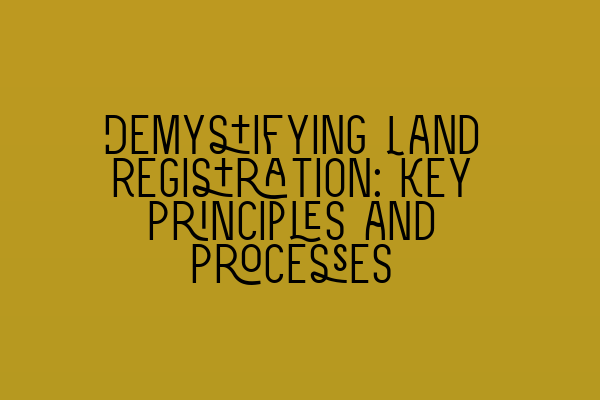Demystifying Land Registration: Key Principles and Processes
Welcome to the blog of SQE Property Law & Land Law! In this post, we will demystify the intricate world of land registration and provide you with an understanding of its key principles and processes. Whether you are a property owner, buyer, or legal professional, having a clear grasp of land registration is essential for various reasons, including protecting your property rights and ensuring smooth property transactions.
SQE Preparation for Property Practice: Mapping Out Your Strategy
Updates in UK Property Laws: Key Changes and Implications
Legal challenges in property transactions: A comprehensive guide
Navigating Lease Laws in the UK: Essential Guidelines for Tenants and Landlords
Dominate Property Law Questions: Avoiding Common Pitfalls
Understanding Land Registration
Land registration is the process by which the ownership and other interests in land are officially recorded and documented. The aim of land registration is to provide clarity and certainty regarding ownership, prevent fraud, and facilitate the transfer of property rights. In the United Kingdom, land registration is governed by the Land Registration Act 2002, which sets out the principles and procedures for land registration.
The Key Principles of Land Registration
1. Registration is conclusive proof of ownership: Once registered, the register is the ultimate evidence of ownership. This means that the registered owner’s ownership cannot be challenged, except in exceptional circumstances.
2. Indemnity principle: The Land Registry provides indemnity to the registered owner against any loss suffered due to a mistake in the register. This helps to protect innocent parties in case of errors or fraud.
3. Priority of interests: The register determines the priority of different interests in the land. The general rule is that earlier registrations take priority over later registrations, giving certainty to potential purchasers and lenders.
The Land Registration Process
The land registration process typically involves the following steps:
1. Application for First Registration: When land is being registered for the first time or there is a change in ownership, an application for first registration must be made to the Land Registry. This includes submitting the necessary forms and supporting documents, such as conveyancing deeds and plans.
2. Examination of the Application: The Land Registry examines the application to ensure compliance with the requirements of the Land Registration Act 2002. They check the forms, documentation, and any restrictions on the land to be registered.
3. Official Search: The Land Registry carries out an official search to discover any other interests or rights affecting the land, such as existing mortgages, leases, or easements. This search helps potential purchasers or lenders know the full picture before proceeding with a transaction.
4. Registration and Issuing of Title: Once satisfied with the application and search results, the Land Registry registers the land, issues a unique title number, and updates the register. The registered owner receives a certificate of title as proof of ownership.
5. Ongoing Registration: The landowner should regularly update the register to reflect any changes, such as mortgages, easements, or transfers of ownership. Failure to keep the register up-to-date may result in complications in future transactions.
The Benefits of Land Registration
Land registration offers several benefits, including:
- Protection of ownership rights and legal title
- Greater certainty and reduced risk of disputes
- Facilitation of property transactions
- Prevention of fraudulent claims
- Transparency in the property market
By ensuring your property is registered and the register is kept up-to-date, you can enjoy these benefits and have peace of mind regarding your ownership.
For more comprehensive information on property law topics, we invite you to check out our related articles:
SQE Preparation for Property Practice: Mapping Out Your Strategy
Updates in UK Property Laws: Key Changes and Implications
Legal challenges in property transactions: A comprehensive guide
Navigating Lease Laws in the UK: Essential Guidelines for Tenants and Landlords
Dominate Property Law Questions: Avoiding Common Pitfalls
Thank you for reading and feel free to reach out to SQE Property Law & Land Law for all your property law needs. Our team of expert solicitors is here to assist you.
